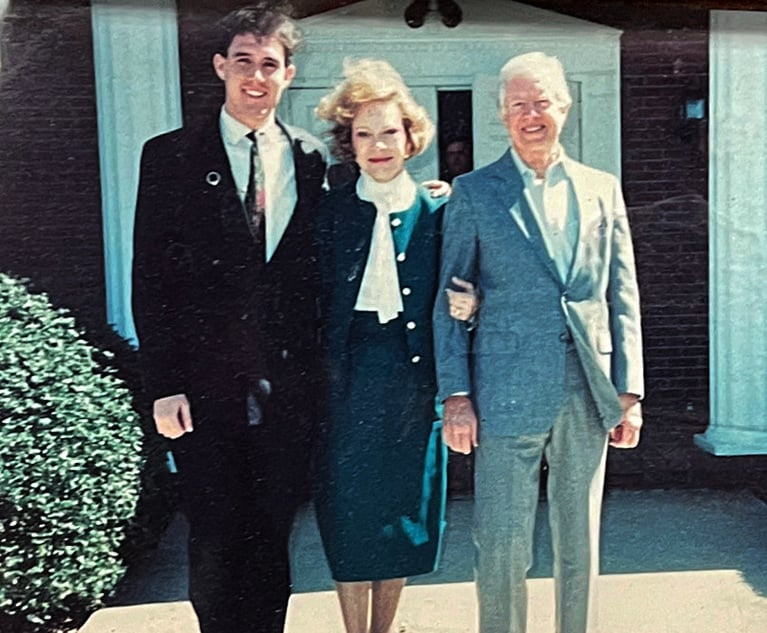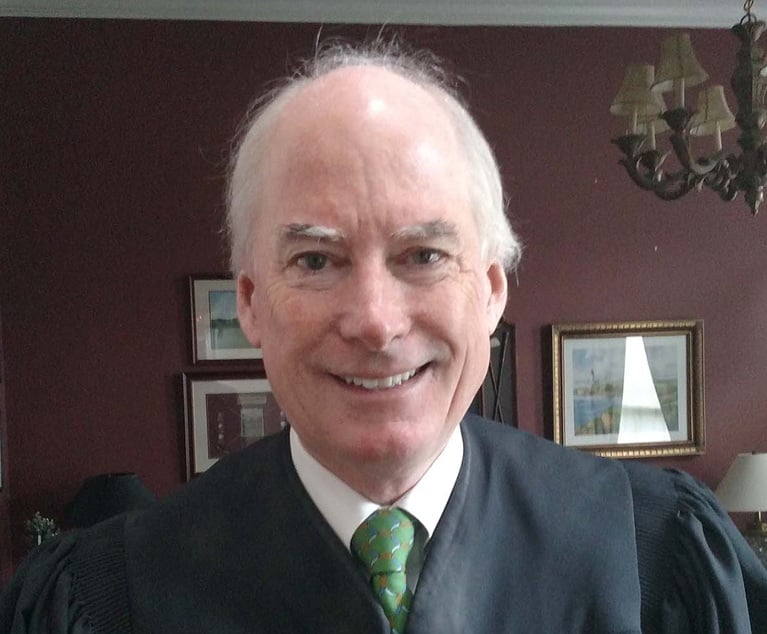What Experts Want Lawyers to Know About Attorney-Ethics Charges
"Be totally prepared. Be honest, and don't be emotional," said legal ethics expert Mark Dubois.
September 23, 2019 at 11:52 AM
4 minute read
 Photo: Shutterstock
Photo: Shutterstock
Experts say getting representation to defend an attorney discipline case is wise, but many lawyers don't heed that advice.
 Click here to read special report
Click here to read special reportFor attorneys facing disciplinary action, the process can be daunting—even for litigators—and especially for first-time respondents. Former attorney-prosecutors say all defendants need legal counsel. They say in order to win in the grievance-complaint maze, attorneys in the hot seat must follow important steps.
A key part of the process: being contrite and acknowledging wrongdoing. In defending themselves against allegations of wrongdoing, some attorneys feel the need to pin blame on their accusers. But that almost never goes over well with tribunals entrusted with protecting the profession and public interest, according to three experts who prosecuted lawyers or defend them before Connecticut's grievance committee.
 David P. Atkins. Courtesy photo
David P. Atkins. Courtesy photo"An attitude of humility is important," said David P. Atkins, a member of Pullman & Comley's litigation department and head of its professional liability section. "Do not blame the complainant because that can backfire and be disastrous."
Atkins said "in a case where it's a close call," being contrite could mean the difference between dismissal of the case or further prosecution.
Former First Assistant Chief Disciplinary Counsel Suzanne Sutton agrees.
"You need to acknowledge your own part in the grievance," said Sutton, who spent about nine years prosecuting attorney discipline cases before joining Cohen & Wolf as a member of its legal ethics, litigation and bankruptcy groups. "The disciplinary authorities will appreciate that, and take that into consideration."
The majority of complaints against attorneys stem from allegations of inattentiveness to clients, fee disputes, poor or miscommunication, discrepancies in Interest on Lawyers Trust Accounts, and other general misconduct. A Connecticut Law Tribune review of attorney discipline cases before state grievance panels from January 2014 to August 2019 found there were 317 violations for Rule 1.5, which involves safekeeping property, and 453 violations for misconduct, or Rule 8.4. Most cases do not involve criminal offenses which, the experts say, are hard to fight against.
Be prepared, be honest
"The panel wants a complete description of the history of the representations," Atkins said. "But, at the same time, they do not want to be flooded with every single piece of paper from a lawyer's file. It's important to balance, and that's where we come in."
 Suzanne Sutton, of counsel for Cohen & Wolf
Suzanne Sutton, of counsel for Cohen & WolfWhile many attorneys will be agitated and emotional for being singled out for a grievance, it's important those emotions don't seep into disciplinary hearings, said Mark Dubois, former chief disciplinary counsel. That's often easier said than done, though, concedes Dubois, who now defends attorneys through his private practice at New London-based Geraghty & Bonnano.
"It's really hard to do your own defense work," said Dubois. "If you file on your own, those feelings of anger and frustration will show in the papers you file. Have another attorney, at the minimum, look over the papers. While your feelings might be appropriate and valid, they have no place in legal proceedings."
Dubois continued: "Be totally prepared. Be honest, and don't be emotional."
Another important step for defendants: Address the grievance immediately.
"When attorneys get that letter, it's usually the last thing they want to deal with," Sutton said. "It's personally difficult, and many times it's an older file that you need to research. It's time-consuming and emotionally difficult, but it's important to stay in front of it all."
The good news for lawyers: Most complaints, about 80%, are dismissed, Dubois said.
"You have laypeople filing papers, and lawyers filing papers," Dubois said. "And the lawyer will do the better job."
Read more:
Corey Brinson's Long Road Back: Disgraced Lawyer's Quest for Redemptive Life
Connecticut's 7 Trickiest Bar Rules Tripped Up Hundreds of Lawyers
'The End of the World': Small Missteps Carry Stiff Penalties in Attorney-Ethics Cases
'They Can't Get Out of Bed': The Mental-Health Specter in Attorney-Discipline Cases
This content has been archived. It is available through our partners, LexisNexis® and Bloomberg Law.
To view this content, please continue to their sites.
Not a Lexis Subscriber?
Subscribe Now
Not a Bloomberg Law Subscriber?
Subscribe Now
NOT FOR REPRINT
© 2025 ALM Global, LLC, All Rights Reserved. Request academic re-use from www.copyright.com. All other uses, submit a request to [email protected]. For more information visit Asset & Logo Licensing.
You Might Like
View All
Lessons in Mediation & Negotiation: Attorneys' Reflections on Jimmy Carter

Managing Partner Vindicated in Disciplinary Proceeding Brought by Former Associate
5 minute read
2nd Circuit Revives Connecticut Lawyers' Challenge to Anti-Discrimination Ethics Rule

Trending Stories
Who Got The Work
J. Brugh Lower of Gibbons has entered an appearance for industrial equipment supplier Devco Corporation in a pending trademark infringement lawsuit. The suit, accusing the defendant of selling knock-off Graco products, was filed Dec. 18 in New Jersey District Court by Rivkin Radler on behalf of Graco Inc. and Graco Minnesota. The case, assigned to U.S. District Judge Zahid N. Quraishi, is 3:24-cv-11294, Graco Inc. et al v. Devco Corporation.
Who Got The Work
Rebecca Maller-Stein and Kent A. Yalowitz of Arnold & Porter Kaye Scholer have entered their appearances for Hanaco Venture Capital and its executives, Lior Prosor and David Frankel, in a pending securities lawsuit. The action, filed on Dec. 24 in New York Southern District Court by Zell, Aron & Co. on behalf of Goldeneye Advisors, accuses the defendants of negligently and fraudulently managing the plaintiff's $1 million investment. The case, assigned to U.S. District Judge Vernon S. Broderick, is 1:24-cv-09918, Goldeneye Advisors, LLC v. Hanaco Venture Capital, Ltd. et al.
Who Got The Work
Attorneys from A&O Shearman has stepped in as defense counsel for Toronto-Dominion Bank and other defendants in a pending securities class action. The suit, filed Dec. 11 in New York Southern District Court by Bleichmar Fonti & Auld, accuses the defendants of concealing the bank's 'pervasive' deficiencies in regards to its compliance with the Bank Secrecy Act and the quality of its anti-money laundering controls. The case, assigned to U.S. District Judge Arun Subramanian, is 1:24-cv-09445, Gonzalez v. The Toronto-Dominion Bank et al.
Who Got The Work
Crown Castle International, a Pennsylvania company providing shared communications infrastructure, has turned to Luke D. Wolf of Gordon Rees Scully Mansukhani to fend off a pending breach-of-contract lawsuit. The court action, filed Nov. 25 in Michigan Eastern District Court by Hooper Hathaway PC on behalf of The Town Residences LLC, accuses Crown Castle of failing to transfer approximately $30,000 in utility payments from T-Mobile in breach of a roof-top lease and assignment agreement. The case, assigned to U.S. District Judge Susan K. Declercq, is 2:24-cv-13131, The Town Residences LLC v. T-Mobile US, Inc. et al.
Who Got The Work
Wilfred P. Coronato and Daniel M. Schwartz of McCarter & English have stepped in as defense counsel to Electrolux Home Products Inc. in a pending product liability lawsuit. The court action, filed Nov. 26 in New York Eastern District Court by Poulos Lopiccolo PC and Nagel Rice LLP on behalf of David Stern, alleges that the defendant's refrigerators’ drawers and shelving repeatedly break and fall apart within months after purchase. The case, assigned to U.S. District Judge Joan M. Azrack, is 2:24-cv-08204, Stern v. Electrolux Home Products, Inc.
Featured Firms
Law Offices of Gary Martin Hays & Associates, P.C.
(470) 294-1674
Law Offices of Mark E. Salomone
(857) 444-6468
Smith & Hassler
(713) 739-1250










